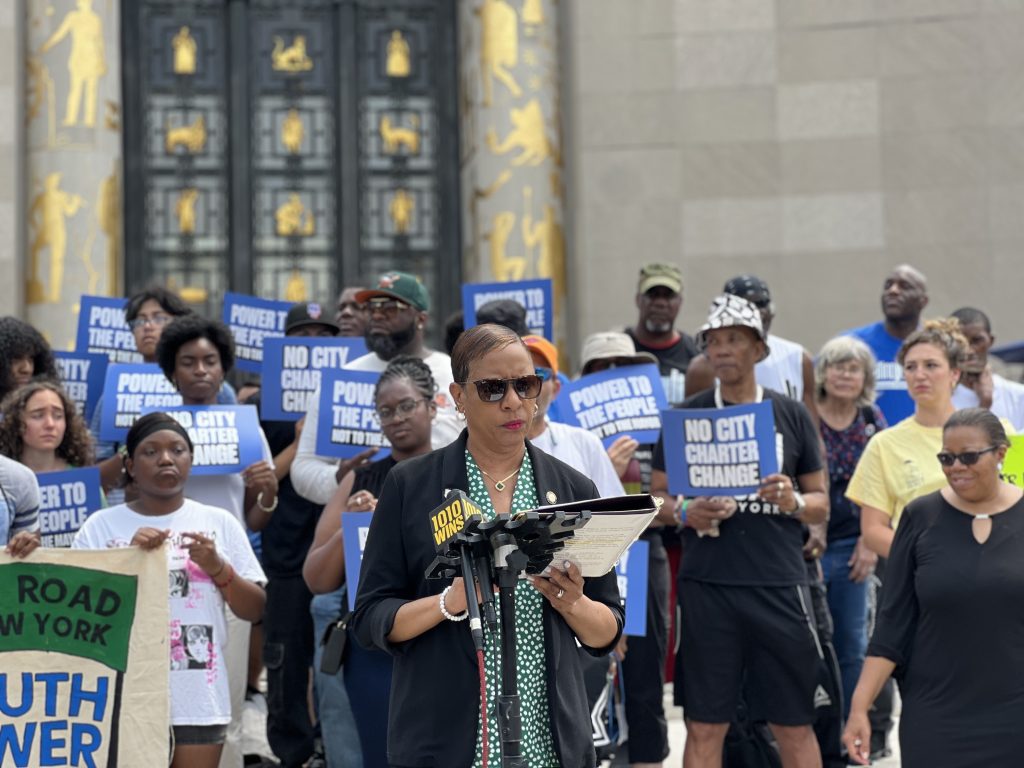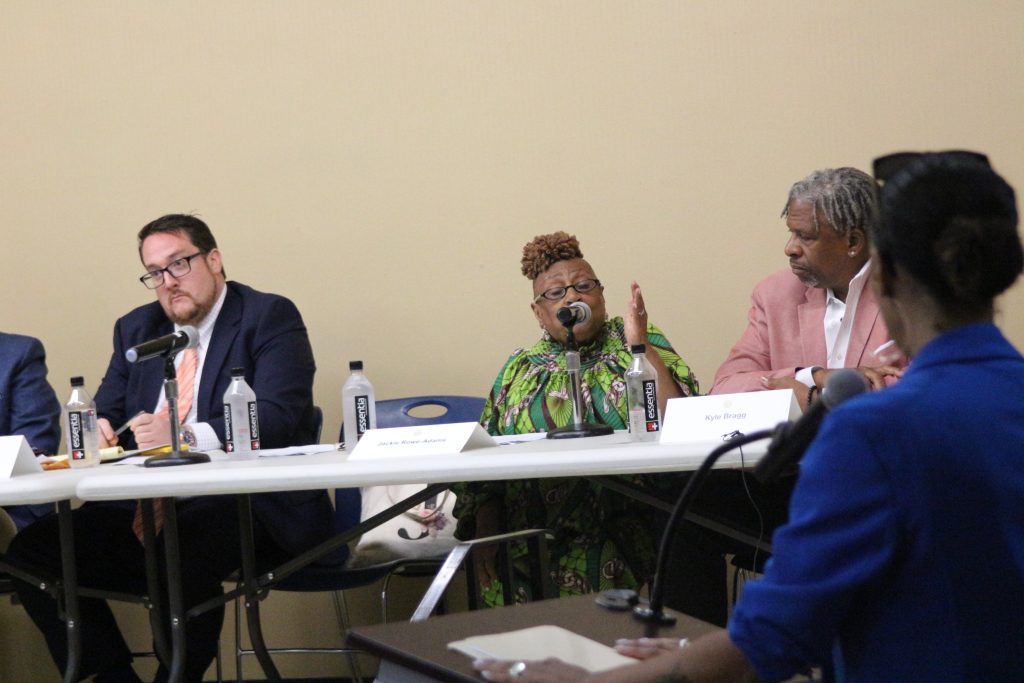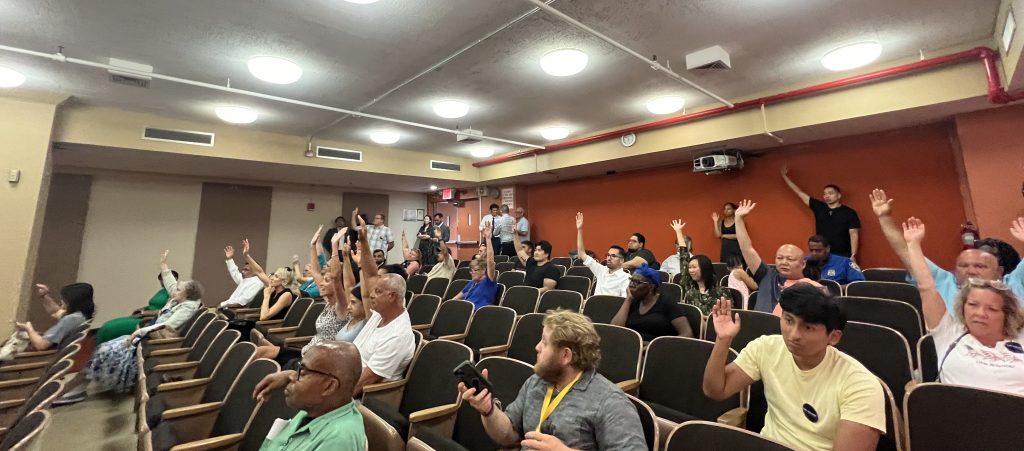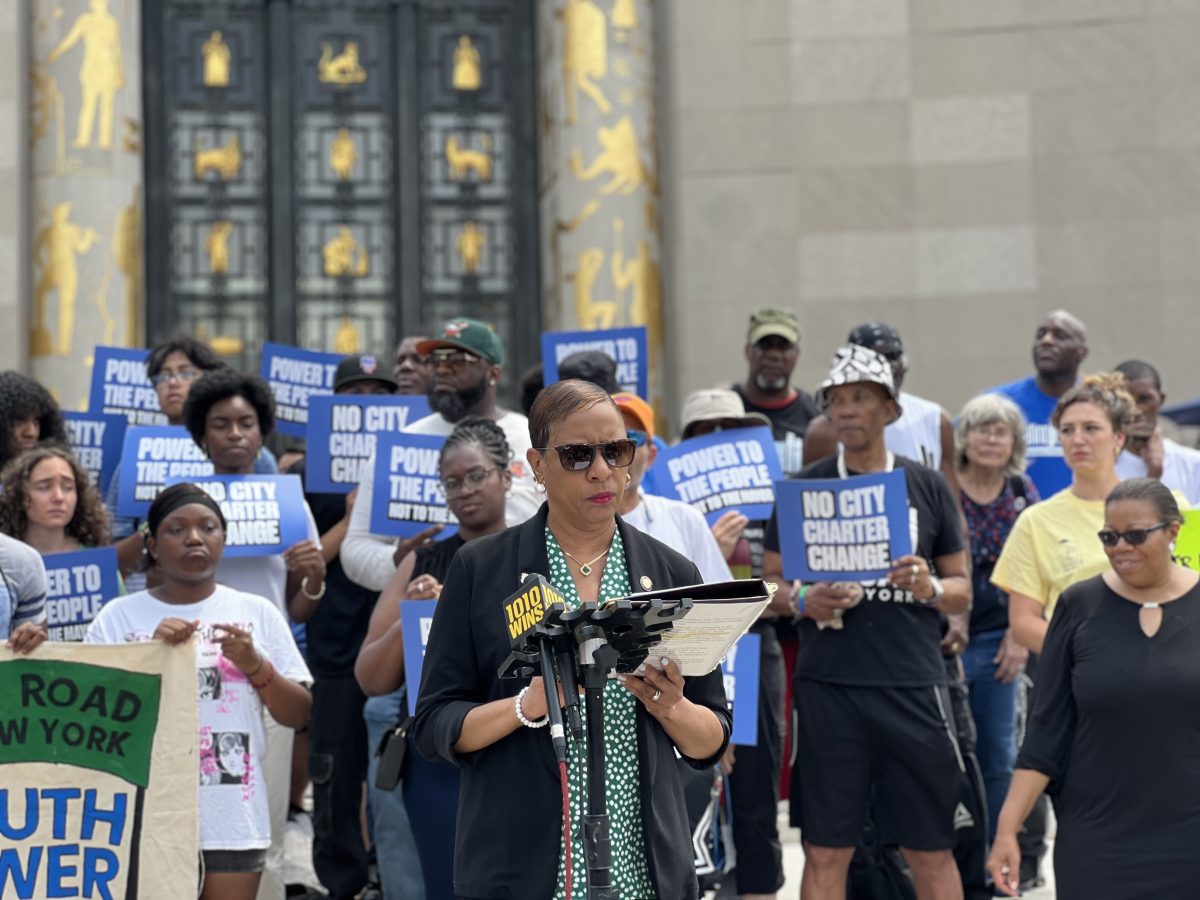Charter Revision Recap: Bad Blood Between Adams Loyalists and Councilmembers
By Celia Bernhardt | cbernhardt@queensledger.com

“Do you want a king?” Speaker Adrienne Adams asked the crowd at an anti-Charter Revision rally. Credit: Celia Bernhardt
Power struggles between the City Council and the Mayor’s office were on full display in the final week of meetings for the Charter Revision Commission.
Stacked with Mayor Adams’s close allies, the Commission was tasked with presiding over a review of the city’s governing document, sourcing feedback from the public and producing ballot proposals for voters to weigh in on. Adams announced its launch one week after the Daily News reported the Council was planning to list an “advice and consent” bill — which would increase the body’s oversight on the Mayor’s agency appointments — as its own November ballot proposition. Because of an existing rule in the charter, if the Commission submits its own ballot referendum, it would take the place of any that the Council submitted, knocking their timeline back another election cycle.
The Council has slammed the process as a power grab by the mayor intended to push advice and consent off the ballot. They also argue that the process — just two months from start to finish, with 12 public meetings — is too rushed for the task of a public review of the city’s entire charter.
The New York Times reported that Adams’s initial motivation for launching the process was to lessen the likelihood of future repeats of the “How Many Stops” act. The legislation requires the NYPD to file more detailed records of their interactions with the public and, despite pushback from Adams, had enough approval among the Council to override the Mayor’s veto. Members of a Harlem-based anti-crime group met with Adams in May — three weeks before the Commission was assembled — expressing their disapproval of the act and suggesting charter revision as a means to prevent similar outcomes in the future. Three of those activists ended up on the Charter Revision Commission.
Finalized with a unanimous vote on Thursday, the Commission did indeed craft a proposal that would add time-consuming steps in the process of passing public safety legislation (though its final draft was significantly softened in the eleventh hour). Also among the Commission’s proposed amendments is one requiring additional financial assessments from the Council, and one from the Mayor’s Office of Management and Budget, for each piece of proposed legislation. Councilmembers have expressed disdain for this proposal as well, arguing it is designed to slow down lawmaking and undermine their own financial expertise.
The Commission met at the Brooklyn Public Library on Thursday, July 25 to vote for all five drafted proposals, some of which had been amended just minutes before the meeting. Councilmembers including Speaker Adrienne Adams and Gale Brewer joined progressive representatives and organizers in a rally outside the library to slam the Charter Revision process.
“This is a dangerous attempt to shift power away from the people represented by the city council to one single individual,” Speaker Adams said. “Do you want a king?”
Rallygoers emphasized the rapid pace of the proceedings, noting that the Commission released their final proposals less than 24 hours after the process’s final public hearing in Jamaica, Queens that Monday — and less than 48 hours before the Commission’s final vote that day.
“The Mayor’s Commission hopes to hide their political motivations and confuse New Yorkers with some of these proposals, but they have underestimated you. They have underestimated New Yorkers, our ability to see through the fog,” Speaker Adams said. “If the proposals by this Mayor’s Commission end up on the ballot in November, New Yorkers should oppose them.”
Fighting Words
In that final public hearing before the report was released, Charter Revision Commission members took significant time responding to critical testimonies from progressive Councilmembers, engaging in sometimes-heated back-and-forth with the local representatives and keeping many at the podium long past the three-minute cutoff for testimony. In the end, testimony from about a dozen Councilmembers took up the first hour and a half of the hearing. Once the floor was turned over to members of the public, the Commission began to strictly enforce three-minute limits on testimony and did not engage in extended dialogue with the speakers.
Jabs between the Commission and Councilmembers circled around general sentiments regarding transparency and power between branches of government, highlighting the resentment growing between the Council and the Adams administration. While pushing back against Councilmembers’ criticisms of Adams, some Commission members framed the Council as a closed-door, undemocratic body, while arguing that they themselves — by virtue of holding multiple public hearings — would generate ballot proposals more representative of the people of New York.
After Bronx Councilmember Pierena Sanchez argued that the charter review process was rushed, Commission member Jackie Rowe-Adams, co-founder of Harlem Mothers S.A.V.E., asked Sanchez whether she thought that “the Council acts too quickly in some of the hearings they hold for themselves and not the public.” Sanchez responded that the council took an average of 270 days to deliberate on legislation generally, and 570 days for public safety measures in particular. Rowe-Adams then claimed that the Council did not hold public hearings during the legislative process.
“I want to go back to the public hearings — you have not had public hearings,” Rowe-Adams said, adding that she had attempted to testify at a hearing on the How Many Stops act.
“I came down as a taxpayer, as a community person, as a person who cares about the city. I was turned away. I was told only the City Council could testify, not the public,” Rowe-Adams said. “When you raise these questions, it’s like, oh, you’re opening the door for the public — but you’re not. You’re opening the door for the media and others that you send.”
Sanchez and Councilmember Julie Won explained to Rowe-Adams that, according to records, she had attempted to testify at a Council-only vote rather than a public hearing, and that she would have been welcome to testify at the latter occasion.
Councilmember Sandy Nurse was next to testify.
“We are 51 people. We voted for this,” Nurse said of the Council’s advice and consent proposal. “We represent the will of New Yorkers. They elected us here and this is what has come out of their election. And so delaying this from being on the ballot is really robbing them of what is already their right to vote on this.”
“How many millions elected the mayor?” Rowe-Adams asked after Nurse had finished speaking.
“I don’t know, you probably have better math than me,” Nurse said.
“Zero. zero millions,” Councilmember Chi Ossé called out from his seat
“The mayor was elected by millions of people to do just what you said. And quite a few millions of people say he’s doing a good job,” Rowe-Adams continued.
Nurse, given the number by a colleague, then informed the Commission that Adams received only 753,000 votes.
“The mayor is the executive of this city, and he has sweeping powers. But we are also elected, and we are the co-equal branch,” Nurse said.
“He’s the mayor. And that’s the bottom line,” Rowe-Adams said after a brief back-and-forth with Nurse.
“He is the mayor and we are the Council and that is in the charter,” Nurse replied.
As she continued to field pushback and questions from other Commission members, Nurse expressed that Councilmembers and their district office staff are often stuck “trying to put out fires” for their constituents due to unresponsiveness from city agency heads.
“We are constantly at the mercy of city agencies to solve these issues,” Nurse said. “Which goes right back to the point that advice and consent is about.”
Commission member Lorraine Grillo, who previously served as first deputy mayor to Adams, shot back.
“The agency heads under this administration are some of the finest people that I’ve ever worked with, and I really feel that it is improper, maybe unconscionable, to be criticizing these people who work so darn hard,” Grillo said.

Commission member Jackie Rowe-Adams speaks to Councilmember Sandy Nurse. Credit: Celia Bernhardt
“I have not said anything that is a personal attack on anybody,” Nurse said. “This is about the long haul. We could have a lot of different mayors, and they could appoint a lot of different people. We had a commissioner who had to resign because of corruption under this administration. And I didn’t want to name that, but I’m naming it,” Nurse continued, likely referencing former Buildings Commissioner Eric Ulrich.
Tensions reached a peak after Councilmember Shahanah Hanif’s testimony, which she began by saying that she regretted legitimizing the process of the Commission by testifying, and quoted Speaker Adams’ critique of the process as “wholly unserious.”
Three different Commission members made comments in response, expressing offense to Speaker Adams’s comments and defending the process. Commission Chair Carlo Scissura said he found it “striking” that the Speaker “would call us not serious.” Kyle Bragg argued that the public hearings had involved “robust, robust dialogue.” Rowe-Adams said she was “taken aback.”
“I want to say to our Speaker that we are serious. And I know it’s not a personal attack, but it is an attack from different people. I’m just tired of hearing a lot of negativity about this Commission,” Rowe-Adams said.
Hanif highlighted the turnout for the Commission’s meetings in her response.
“The public hearings that you all have had been sparsely attended, and specific, specific constituents have attended those hearings,” Hanif said. “We are saying again — for maybe the third time — that we want a longer process so there’s richer conversation and dialogue and discourse about what public safety in New York City means.”
The remainder of the night arguably illustrated Hanif’s point about the specificity of public hearing attendees. Nearly every member of the public was there to testify in favor of a ballot referendum on New York’s Sanctuary City status. Scissura eventually asked the room to raise their hand if they planned to speak about Sanctuary City, and the vast majority did; Scissura repeatedly reminded attendees, in between testimonies, that the Commission “got it,” and that they did not need to continue speaking about the issue.

A show of hands for attendees who planned to testify about Sanctuary City. Credit: Celia Bernhardt


